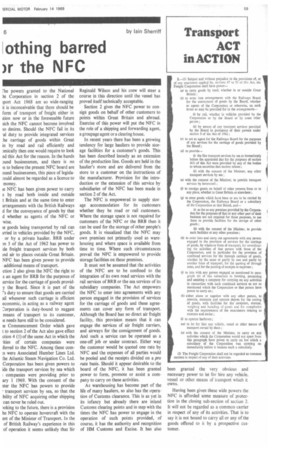othing barred no the NFC
Page 61

If you've noticed an error in this article please click here to report it so we can fix it.
Elm powers granted to the National ht Corporation in section 2 of the Tort Act 1968 are so wide-ranging it is inconceivable that there should be form of transport of freight either in ilion now or in the foreseeable future tich the NFC cannot become involved so desires. Should the NFC fail in its 'al duty to provide integrated services he carriage of goods within Great in by road and rail efficiently and n'nically then one would require to look ad this Act for the reason. In the hands 3und businessmen, and there is no
to believe the present NFC board are ound businessmen, this piece of legislaamid almost be regarded as a licence to money.
Le NFC has been given power to carry s by road both inside and outside t Britain and at the same time to enter arrangements with the British Railways d for the conveyance of goods by that d whether as agents of the NFC or wise.
te goods being transported by rail can vied in vehicles provided by the NFC, or by a private haulier. BRB under m 5 of the Act of 1962 has power to lde freight transport services by both ind air to places outside Great Britain. NFC has been given power to provide additional means of transport.
ction 2 also gives the NFC the right to s an agent for BRB for the purposes of 3ervice for the carriage of goods providy the Board. Since it is part of the ''s duty to ensure that goods are carried ail whenever such carriage is efficient economic, in acting as a railway agent Zorporation is duty-bound to suggest means of transport to its customer, ie needs have still to be considered.
se Commencement Order which gave t to section 2 of the Act also gave effect ction 4 (1) of the same Act in which the ides of certain companies were ferred to the NFC. Among these corn:s were Associated Humber Lines Ltd. the Atlantic Steam Navigation Co. Ltd. Corporation has been given powers to ide the transport services by sea which companies were providing prior to ary 1 1969. With the consent of the ster the NFC has powers to provide transport services by sea, so that the hility of NFC acquiring other shipping can never be ruled out.
>oking to the future, there is a provision he NFC to operate hovercraft with the ent of the Minister of Transport. In the of British Railway's experience in this of operation it seems unlikely that Sir Reginald Wilson and his crew will steer a course in this direction until the vessel has proved itself technically acceptable.
Section 2 gives the NFC power to consign goods on behalf of other customers to points within Great Britain and abroad. Exercise of this power will put the NFC in the role of a shipping and forwarding agent, a groupage agent or a clearing house.
In recent years there has been a growing tendency for large hauliers to provide storage facilities for a customer's goods. This has been described loosely as an extension of the production line. Goods are held in the haulier's store and are delivered from the store to a customer on the instructions of the manufacturer. Provision for the introduction or the extension of this service by subsidiaries of the NFC has been made in section 2 of the Act.
The NFC is empowered to supply storage accommodation for its customers whether they be road or rail customers. Where the storage space is not required for customers of the NFC or the BRB then it can be used for the storage of other people's goods. It is visualized that the NFC may own premises not primarily used as warehousing and where space is available from time to time. Where such circumstances prevail the NFC is empowered to provide storage facilities on these premises.
It must not be assumed that the activities of the NFC are to be confined to the integration of its own road services with the rail services of BRB or the sea services of its subsidiary companies. The Act empowers the NFC to enter into agreements with any person engaged in the provision of services for the carriage of goods and these agreements can cover any form of transport. Although the Board has no direct air freight facility, this provision means that it can engage the services of air freight carriers, and airways for the consignment of goods. And such a service can be operated as a one-off job or under contract. Either way the customer would be quoted one rate by NFC and the expenses of all parties would be pooled and the receipts divided on a pro rata basis. Should it appear desirable to the board of the NFC, it has been granted power to form, promote or assist a company to carry on these activities.
As warehousing has become part of the life of many hauliers, so also has the operation of Customs clearance. This is as yet in its infancy but already there are inland Customs clearing points and in step with the times the NFC has power to engage in the operation of such points provided, of course, it has the authority and recognition of HM Customs and Excise. It has also been granted the very obvious and necessary power to let for hire any vehicle, vessel or other means of transport which it owns.
Having been given these wide powers the NFC is afforded some measure of protection in the closing sub-section of section 2. It will not be regarded as a common carrier in respect of any of its activities. That is to say it is not bound to carry all or any of the goods offered to it by a prospective custom er.


















































































































